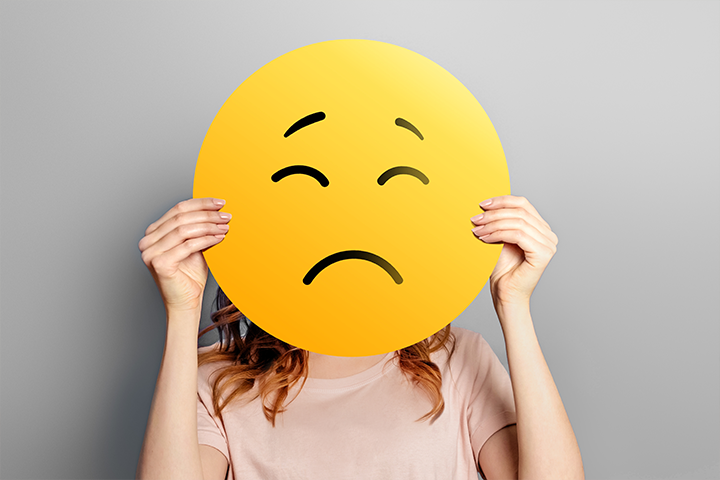You drive home just after 5 p.m. and it's already getting dark. And while it's getting light earlier in the morning now, you still rise before the sun.
If you feel glum because the day just seems so short in fall and winter, you're not alone. But if you feel noticeably sad, anxious or uninterested in things that you normally enjoy at this time of year, you might have seasonal affective disorder.
Also called “seasonal depression," SAD is a recognized mental health condition the National Institute of Mental Health calls a common but serious mood disorder. It typically comes on during fall and winter when there's less sunlight and gets better in the spring. According to the American Psychological Association, shorter days with less sunlight affect our circadian rhythm, the body's internal clock, which can cause changes to the brain.
People may avoid getting help because they:
- may not realize what's happening to them
- don't know treatment is available
- think that because SAD can be temporary, they'll just wait it out

Who Gets SAD?
The latest numbers say approximately 5% of the population experiences SAD. But those numbers may be wildly inaccurate because this condition is often misunderstood and underreported. While it can strike anyone, SAD usually:
- starts between the ages of 18 and 30
- is more common in women
- may run in the family
- more often strikes people with other mental health conditions including:
- depression
- bipolar disorder
- attention-deficit/hyperactivity disorder
- eating disorders
- anxiety
- panic disorder
Symptoms of SAD
Sadness is, not surprisingly, a key symptom of SAD. But there are others:
- feeling empty or hopeless
- excessive worrying or fear
- reduced interest in social activities and hobbies
- altered sleeping habits
- changes in weight or appetite
- overuse of alcohol or drugs
- thoughts of death or suicide attempts
Treatments for SAD
In most cases, SAD symptoms go away in the spring. But there's no reason to suffer for months when there are proven treatments to help.
1. Light Therapy – The most common treatment for SAD, light therapy is effective about 60-80% of the time, according to the APA. It involves sitting in front of a special light box that mimics natural daylight for 20-30 minutes a day. For best results:
- Use first thing in the morning, right after you wake up.
- Use the recommended bulb, which is very bright and filters out ultraviolet rays. Using the wrong bulb can make the treatment ineffective and even harmful.
2. Exercise – The hormones released during exercise are known to be mood boosters. The Mayo Clinic says regular exercise can help with everything from depression to sleep. It's important to note that exercise alone may not be enough to help with SAD or depression but is one way to help combat the symptoms.
Here are some exercise tips:
- Start slowly if you don't already have a regular fitness plan. Try to exercise at least three days a week for at least 30 minutes each time.
- Get outdoors if the weather allows. That natural light will help.
- Mix it up! A combination of aerobic exercise, weight training and lower-intensity activities like yoga or tai chi can help you get fit without getting bored.
- Always check with your doctor first before starting an exercise plan.
3. Cognitive Behavioral Therapy – Also known as talk therapy, CBT is widely used in therapy to treat SAD, depression and other conditions. It works by:
- addressing negative thinking that can lead to depression and a sense of hopelessness
- helping people learn good coping techniques
- When looking for a therapist to treat SAD, make sure they practice CBT.
4. Medication – Your doctor or therapist may recommend selective serotonin reuptake inhibitors. SSRIs are the most common antidepressants to treat SAD. When you talk to your doctor or therapist, you should:
- Give a complete family history of depression or mental illness.
- Be honest about alcohol and drug use so you aren't prescribed something that could endanger your health.
- Ask about any side effects so you're prepared.
- Find out how long it typically takes to start working so you know what to expect.
5. Vitamin D – Several studies show this vitamin can help with depression and boost your mood. We naturally get vitamin D from the sun, so it may be especially important to boost production during colder months. Before taking Vitamin D or any supplements, be sure to talk to your doctor because:
- Supplements may interfere with medication you're taking.
- Certain supplements may not be right for you depending on your health history.
- You may not know the right type or amount to take.
6. Get into a routine – Here's where that circadian rhythm comes in again. Your sleep patterns may be off throughout the fall and winter because of the shorter days. Setting a more structured schedule that includes sleeping, eating and exercising can help. Here are a few tips to try:
- Wake up and go to sleep at the same time for best results.
- Turn off the TV and put down your phone at least an hour before bedtime. This can help you relax and destress, which can improve your sleep.
- Include favorite activities in your schedule. Making time for friends, artistic pursuits, reading or any other favorite hobbies or pastimes is important for your ongoing mental health.

Getting Help
If you think you have SAD or feel depressed at any time of year, talk to your doctor or connect with a mental health professional.
Thankfully, you have mental health coverage on every TRS health plan, including:
- Medication-assisted treatmentfrom licensed mental health providers
- Specialists including addiction psychiatrists and licensed alcohol and drug counselors
- virtual mental health care
- inpatient treatment
Resources for TRS-ActiveCare and TRS-Care Standard
Provider Finder®
Search for an in-network mental health provider by location, gender, specialty and more.
Teladoc™
Make a virtual mental health appointment for nonemergency mental health conditions with a licensed therapist, psychologist or psychiatrist.
Headway
Connect with an in-network mental health provider quickly and easily. You can even get same day matching with providers who have openings within 48 hours.
Mental Health Personal Health Guide
Get real-time help from specially trained PHGs who can help you find a provider or get help in a crisis. Be sure to ask for mental health help when you call 1-866-355-5999, available 24/7.
Well onTarget®
Take self-guided courses or get one-on-one support from a credentialed health expert. These wellness coaches can help you with stress management, postpartum care, fitness, and dietary habits that could affect your mental health.
Learn to Live
Get matched with the right digital mental health program for the support you need for issues like stress, anxiety, worry, depression, insomnia and sleep problems, social anxiety, and substance misuse.
Resources for TRS-Care Medicare Advantage
SilverSneakers®
Exercise is a proven mood booster. A brisk walk, yoga session, or dance class can release endorphins and reduce symptoms of depression. Even 20 minutes a day can make a difference. SilverSneakers is more than a fitness program. It's an opportunity to improve your health, gain confidence and connect with your community. Plus, it's included at no additional cost in your TRS-Care Medicare Advantage plan.
Get started today by visiting SilverSneakers.com/StartHere
Let's Move by UnitedHealthcare®
Isolation can worsen depression. Stay connected with friends, family, or support groups. Virtual chats, phone calls or meet-ups over coffee can help brighten your day. With simple resources, tools, fun events and personalized support, Let's Move by UnitedHealthcare® is here to help keep your mind, body and social life active. Start today — visit letsmovebyuhc.com
Real Appeal®
A balanced diet rich in whole foods can stabilize your mood. Incorporate omega-3 fatty acids (found in fish and nuts) and limit processed foods and sugar, which can trigger energy crashes. Real Appeal® is a proven weight management program designed to help you get healthier and stay healthier. It's available to you and eligible family members at no additional cost as part of your TRS-Care Medicare Advantage benefits. Join today at uhc.realappeal.com